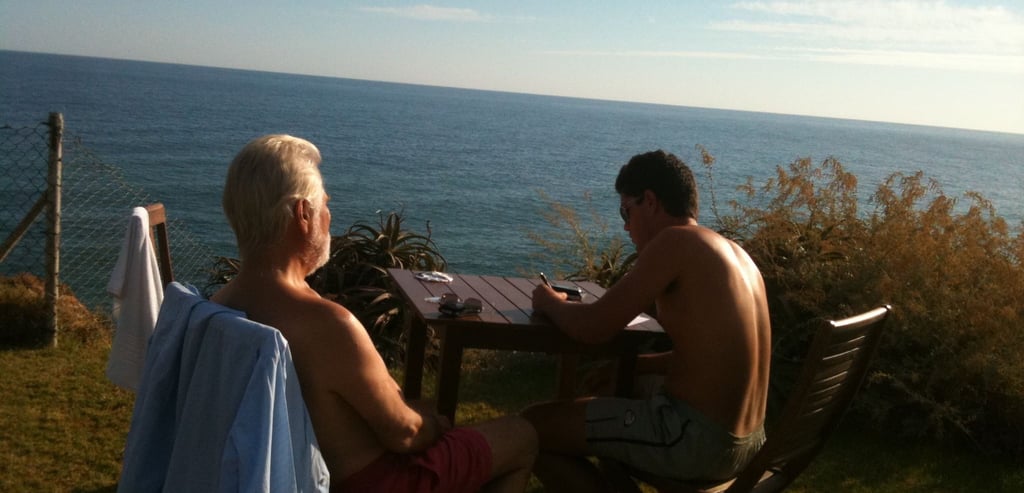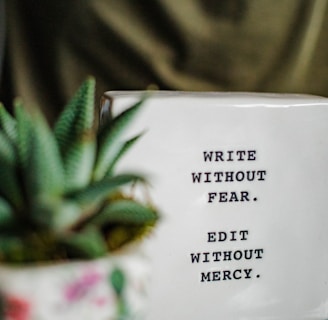
5 essential tips for beginning screenwriters


If you are totally new to the craft or have dabbled in it for years but never dived fully in, these 5 first screenwriting tips are essential in propelling you off on your creative journey. I could probably write 99 tips (and knowing me, I probably will later) but if you can dive into these 5 head first, you'll be off to a good start.
In this and in future blogs on the craft I will always include links to great resources and other pro's takes on the craft, because there is some great stuff out there in cyberspace and this is a team sport. So when you see a button or some text highlighted in green, click on it if you want to learn more.
For example, after taking a small chunk of your life to whiz through this golden info, come back and click on the greenies, like this: screenwriting tips and you will be taken some place magical, or more likely just another website with cool insights and other valuables on it as well. And even if that site is technically my "competition", winning in this craft is good for everyone, so visit the multitudes for words of wisdom, but be sure to come back and hear my humble take on the rebound.
As I noted above, there are plenty of essentials to the craft, yet, because you are just starting out so you don't need sensory or brain overload. Just nail these 5 basics, as big as they are, and then we'll keep talking. Good luck out there in the void!
1. The Big Idea. How to find it.
Well, that is assuming you don't have it already. If you do, well, I assume you will probably want to write about another idea when your big one is done, so hear me out.
First and foremost, the old adage, "write what you know", slides into the picture. It is really, wait - let me put that in italics for emphasis - it is really important that you have some authority on the subject you choose to examine and embark on. If you are going to write a high concept (more on that term later) medical drama about a PHD student who stumbles upon the cure for cancer, it is probably a good idea A) you are already a doctor, or B) you have done a truckload of research on the profession, or at least a half-wheelbarrow full. Do not dive into that story if your entire knowledge of medicine is based on having binge watched all of Grey's Anatomy, Scrubs, and Nurse Jackie.
Same goes for monster trucks, although the education demands are a tad lower. You probably could get away with creating some unwitting visitor from France to be your unlikely hero, winning it all..whatever that is, like the Monster Cup or Monster Bowl - ok, do some minimal research on monster truck culture and insights- like enough to fill one of those toddler red plastic wheelbarrows.
Which takes me to the even more important angle than writing what you know and that is writing what you like. Italics again. And caps, in bold. WRITE WHAT YOU LIKE.
Seriously. The worst rookie mistake to make is trying to write something you think someone else might like, but you end up getting bored with it, or lost. Nope, you need to have that passion, that eagerness to really dive into the story because YOU are into it and you want to make sure, or at least sure as hell hope, that other people will be too.
So that basically means pick a genre. Think of what gets you emotionally involved when you sit down for an evening in front of the old squawkbox, or better yet, when you dish out some of your hard earned bucks to reward the local cinema with your presence. Which movie poster hustled you and made you fork it over?
I just g-g-g-googled it and my suspicions are correct, over half of all movies worldwide are dramas. Comedy trails way back in 2nd with about 28 percent. Don't believe me? Check it out here. Bottom line is one out of you two will be writing a drama, and that is super-fine, as long as you LIKE dramas.
So once you whittle it down to what you like and know, then start the hunt. And yes, the best place to go on a story safari is yourself, because you have been around for awhile, seen a lot, done a lot and met loads of people who have also seen and done a lot. And that is what makes you different from the average Josephine. You and your contacts all have stories, and most likely some of them are cinematic. And no, I do not mean you have to write an autobiography, but you can always change and/or embellish true-life mind benders that happened to you or someone you know. So start jotting them down and soon you will have a garden to choose from.
If somehow your life is barren of substance and you have dwelled in a basement since you were a toddler looking at a wall and itching your nose occasionally, well, then start reading books. Old books. Anything over 75 years old is in the public domain, meaning you can use their published stories. For free! I just did that with an old F. Scott Fitzgerald novella. 120 pages of sheer bliss, loosely based on a master.
And finally. The news, or better yet in 2024, the net. Yee olde world wide web. There is soooooo much news out there that it is freaky. And never ending. Look for the unusual. If something grabs you, preferably not a really well-known event, add it to your garden for possible future plucking.
2. Characters are People. Know them.
Hear them. Experience them.
What guy? What girl? Who is your protagonist?
So many writers fall into the trap of writing a plot rather than a story. The difference is that plot is what happens whereas story explains how your protagonist deals with it.
Your character can be anyone or anything. They can be brave, they can be silly, they can flawed but they have to be themselves… always.
It all comes down to knowing your characters.
Warning, the next 3 paragraphs are..well..skip to the last paragraph and I'll admit it.
There are a few ways to get there. For example, there are numerous character profile sheets you can download online. Write your character bio with fun facts about their past, who they dated in high school, and what they wanted to be when they grow up.
These questions are designed to get you thinking and understanding your characters point of view in the world. So, dig deep, understand their wants and dreams, and you’ll soon find your characters begin to more organically inhabit the story in a whole new way.
Creating great characters requires a combination of unique traits, flaws, and motivations. The essential elements include a well-developed backstory, distinct personality traits, and relatable characteristics that make the character memorable to the audience. What is unusual about them is their ability to defy stereotypes and expectations, offering a fresh perspective that challenges traditional character archetypes. Great characters often possess a complexity that reflects the human experience, making them multi-dimensional and capable of growth throughout the story. Their actions and decisions are driven by a combination of internal and external factors, making them unpredictable and engaging for the audience. Ultimately, great characters are essential for driving the narrative forward and capturing the audience's imagination.
Hahaha, those last 3 paragraphs were definitely written by Mr. or Mrs. A.I. BLECHHH. Talk about a word salad. And Iceberg lettuce with zero substance. I think I posted this like 6 months ago as a placeholder and then promptly forgot to fix it. The life of a writer.
So you don't even have to ignore those 3 paragraphs because you probably already forgot them. And I am not going to delete them because a poignant reminder of how not to coach screenwriters.
My real as in HUMAN advice, is base your character on some fringe person you know so you can nail their traits or nuances. Making your characters feel real is half the proverbial ball game.
If you abracadabra a character out of thin air, then spend some time with them on the shrink sofa, you being the shrink and asking them some loaded questions, like where did you get that scar on your arm and who is your least favorite person in the world and why. I have a list of what I call ACTIVE questions, meaning your character can not say yes or no to them, but has to give a decent answer. Like at a shrink. I've got 99 of them, literally, which I will post in the near future. Until then, just ask them personal questions. Get them talking. And then you'll get to know them.
3. Use Script Writing Software
It is really simple. There is only one industry standard, courier 12 in screenplay format. That's it.
There is a whole Amazon shopping cart full of fun-named software claiming this and that, but cut through the fog, and you will see the road ahead is long and straight. More important than anything, is that you follow it. If you blow off using proper software and just use MS Word or Google Docs tabbing over every time a character burps or points skyward, lip quivering, nobody, except maybe your Mom is going to read it.
What you need to do is make sure your screenplay looks just like everyone else's. But the content, that is a different puppy. That is where you get to soar.
I personally use Final Draft because I am a creature of habit. I got it with my first Mac back in the 90's, but like an idiot, didn't by Apple Stock. If I had, I would be writing this from my beach pad.
If you want some less expensive or even free programs hop onto Youtube and there are few folks who review them all. Here is a decent list of the top ten on screencrafts website.
4. Screenplay Structure. Hug it.
Yeah, the word structure in terms of being creative kind of makes me want to puke. It makes it sound systematic or scientific, like you can just look up the old periodic table of the elements, toss a few together and voila, you are in business.
Nope. You NEED to be free to be creative. BUT, and here is the kicker, that dark and ominous word STRUCTURE can set you free...
The trick here is to understand the elements, periodic or not, that build a screenplay into a mezmerizing movie. Just like screenwriting software, there is an Amazon jungle full of enticing labels of secret formulas for doing this, but they are all variations on the same thing.
Think of it as a mannequin with a large wardrobe closet. You can put anything you want on it, but underneath it's still got 2 arms, 2 legs and a head.
So sure, you can go save the cat or buy 6 books on 3 act structure, but for me, 20th century icon Joseph Campbell nailed this whole storytelling thing with the hero's journey. Spot on, easy to follow, makes sense, and he's a riot (catch him on Youtube). He didn't invent anything, he just pointed it out.
A friend of mine named Chris Vogler took Campbell's work a step further for us screenwriting folk, creating a guide called "The Writer's Journey". Forget all the gazillion books out there on the subject, just read that one and you will finish your screenplay if you understand and apply his remarks on the craft.
So you need to spend a few hours reading that book, or really any book on the craft because again, they are all variations on the same core thing. Then with that knowledge now floating around up there in your head, jump on Netflix or HBO or drag your old dvd player out of the attic and watch a few classic films and see how the hero's journey applies to them. That self-education will definitely help you on your journey.
Even though you have yet tor read about the journey, just remember the most important element to look for is when your character, your "hero", leaves the comfort of their ordinary world and enters the special world. Think Dorothy arriving over the rainbow in Munchkin land. Another simple old dvd player example of this from a classic blockbuster would be in JAWS when landlubber Chief Brody heads out on an old rickety boat to chase a massive man-eating shark.
So look for that moment in those movies where the main character heads off to a place they have never been before, where they embark on their journey. If you can spot that and then focus on that key element in your story, you are way ahead of the game. And it doesn't matter if you want to call it a plot point, the end of act one, the 25 percent mark, or the special world, it is all the same thing for the character, getting them out of their comfort zone with a little kick in the butt to send them on their way.
And yes, this is structure. And this is where structure is your friend. It doesn't tell you how to get there, but it points the way.
5. Finish it. Take a Break. Rewrite.
So with an idea, a character, and a road map for your journey, and hopefully a decent laptop with some proper software installed, you are ready and raring to go. Sure there are more elements to be aware and libraries of advice you can take in, and most of us creative sorts are really good at procrastinating - putting off until tomorrow what you could do today. Don't go there, just jump in head or feet first. There is a whole lot to be said by learning by doing. That is your true self education. Understand the basics, then try it out yourself.
And the real trick here is to write those two key words we writers love the most. The End. It feels so good when you get to the top of that mountain and admire the view. Just make sure you get there. Don't turn back, never quit along the way. Finish the journey.
Then take a deep breath, and maybe a few weeks away from your baby, and them embark on phase 2 of your journey, which is rewriting. But the key thing here is taking that break, distancing yourself from your work which has been embedded in your brain for so long. Your thinker needs a vacation to be able to come back with fresh eyes and see the sun through the trees.
Rewriting is frustrating only when you dive right back into it. Give yourself a break and then rewriting is fun, because you will be able to see what works and what doesn't and you'll be able to tweak it to make it better, which will get you to the top of that second more glorious peak with an even more breathtaking view.
So just remember, this game is a commitment to excellence and enjoyment. Never quit, never look back until you finish it.







